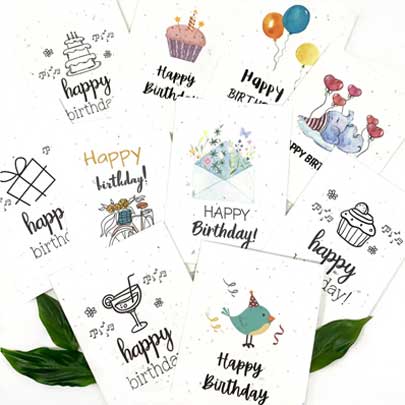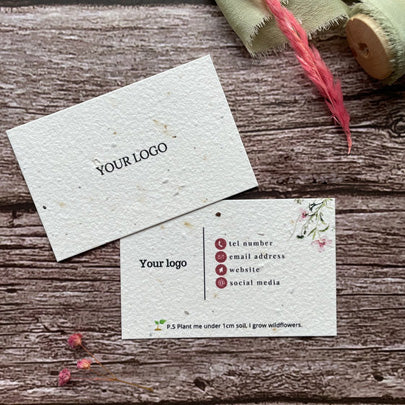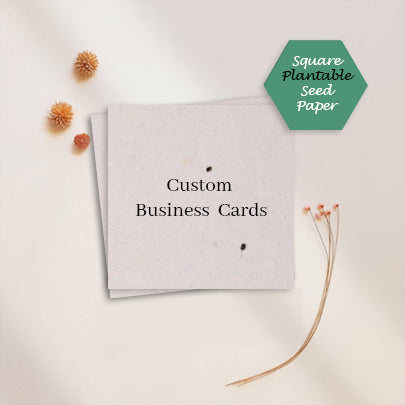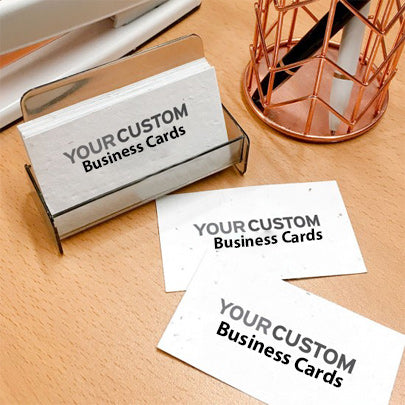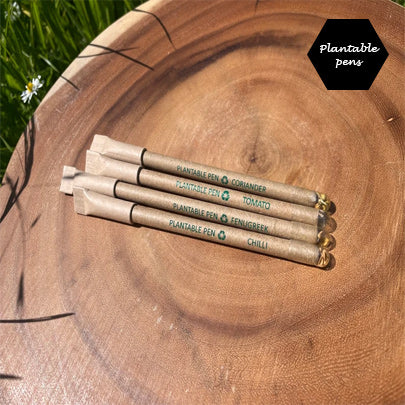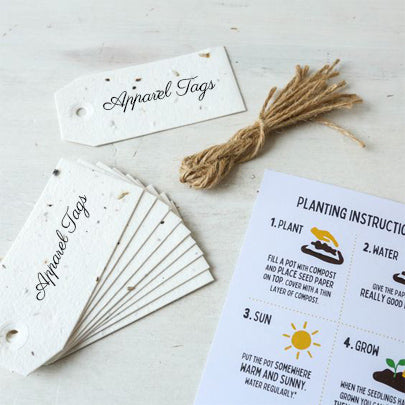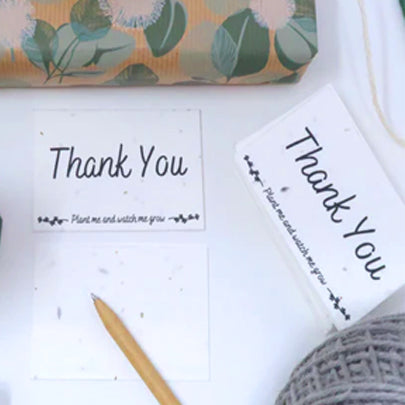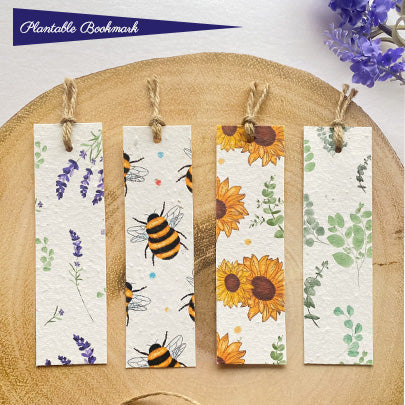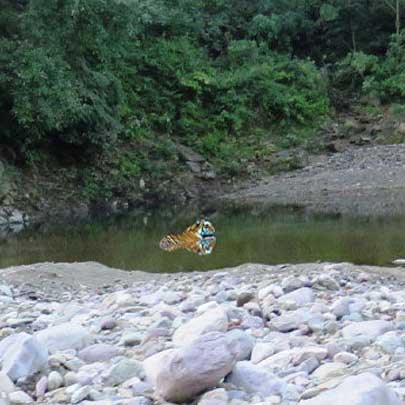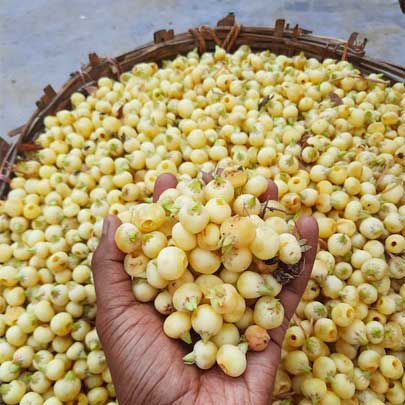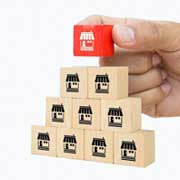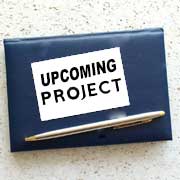Going Green: The Rise Of Seed Paper Business Cards
In today's environmentally-conscious world, businesses continually seek ways to reduce their ecological footprint. One innovative solution gaining popularity is the use of seed paper business cards. These eco-friendly cards serve as a unique and memorable introduction and promote sustainability. This guide explores the rise of seed paper business cards, their benefits and how to incorporate them into your business practices.
1. What Are Seed Paper Business Cards?
Seed paper business cards are made from biodegradable paper embedded with seeds. When planted in soil, the paper decomposes, and the seeds germinate, growing into flowers, herbs or vegetables. These cards offer a sustainable alternative to traditional business cards, which often contribute to waste.
Materials Used
- Recycled Paper: The paper is typically made from recycled materials, reducing waste and conserving resources.
- Non-Toxic Inks: Printing is done using water-based or soy-based inks, ensuring the cards are safe for planting.
- Embedded Seeds: Common seeds include wildflowers, herbs and vegetables, which can be customized based on your preferences and local climate.

2. Benefits of Seed Paper Business Cards
Environmental Impact
- Waste Reduction: Traditional business cards often end up in the trash. Seed paper cards decompose naturally, leaving no waste.
- Promoting Green Spaces: By growing plants, these cards help support local ecosystems and promote biodiversity.
- Carbon Footprint Reduction: Using recycled materials and biodegradable products helps lower the overall carbon footprint of your business.
Marketing and Brand Image
- Unique and Memorable: Seed paper business cards stand out, making a lasting impression on recipients and setting your business apart from competitors.

- Positive Brand Image: Using eco-friendly products enhances your brand's image, demonstrating a commitment to sustainability and social responsibility.
- Conversation Starter: These unique cards often spark conversations about sustainability, helping to build stronger connections with clients and partners.
Economic Benefits
- Cost-Effective Marketing: While the initial cost may be higher, the long-term benefits of enhanced brand image and customer loyalty can outweigh the expense.
- Supporting Local Businesses: Many seed paper manufacturers are small, local businesses. Purchasing from them supports local economies and sustainable practices.
3. How to Incorporate Seed Paper Business Cards into Your Business
Choosing the Right Supplier
- Research and Reviews: Look for reputable suppliers with positive reviews and a commitment to sustainability.
- Customization Options: Ensure the supplier offers customization in terms of design, color and seed type.
- Eco-Friendly Credentials: Verify that the supplier uses eco-friendly practices in their production process.
Design and Printing
- Minimalist Design: Opt for simple, elegant designs that highlight the natural texture of the seed paper.

- Planting Instructions: Include clear planting instructions on the card to guide recipients on how to plant and care for their seeds.

- Brand Consistency: Ensure the design aligns with your brand's visual identity and messaging.
Educating Your Audience
- Informational Inserts: Include an insert with information about the environmental benefits of the seed paper cards and how to plant them.
- Online Resources: Provide additional information on your website or social media about your sustainability efforts and the use of seed paper products.
Integrating into Marketing Strategies
- Event Giveaways: Use seed paper business cards as giveaways at events, trade shows, and conferences to make a memorable impact.
- Customer Engagement: Encourage customers to share photos of their growing plants on social media, creating a sense of community and ongoing engagement with your brand.
- Partnerships: Collaborate with eco-friendly organizations and initiatives to further promote sustainability and reach a broader audience.
4. Success Stories and Case Studies
Real Business Examples
- Eco-Conscious Companies: Highlight stories of businesses that have successfully incorporated seed paper business cards, sharing their experiences and tips.
- Positive Feedback: Share testimonials from clients and customers who appreciated the unique and sustainable touch of seed paper cards.
Measurable Impact
- Environmental Benefits: Provide statistics or examples of the environmental impact, such as the number of flowers grown or the waste reduction.
- Brand Growth: Showcase how adopting sustainable practices, including seed paper business cards, has contributed to business growth and customer loyalty.
5. Challenges and Considerations
Cost and Availability
- Initial Investment: Seed paper business cards may have a higher upfront cost compared to traditional cards. Consider the long-term benefits and potential cost savings from enhanced brand loyalty and marketing effectiveness.
- Supplier Selection: Ensure reliable and consistent supply by partnering with reputable seed paper manufacturers.
Design Limitations
- Printing Quality: Work with suppliers to ensure high-quality printing that maintains the integrity of the seed paper.
- Durability: Seed paper is biodegradable, which may affect its durability. Handle and store the cards carefully to maintain their quality until they are distributed.

Conclusion
Seed paper business cards represent an innovative and impactful way for businesses to promote sustainability while making a memorable impression. By choosing these eco-friendly cards, businesses can reduce their environmental footprint, enhance their brand image and contribute to a greener future. Embrace the rise of seed paper business cards and make a positive impact on both your business and the environment.












